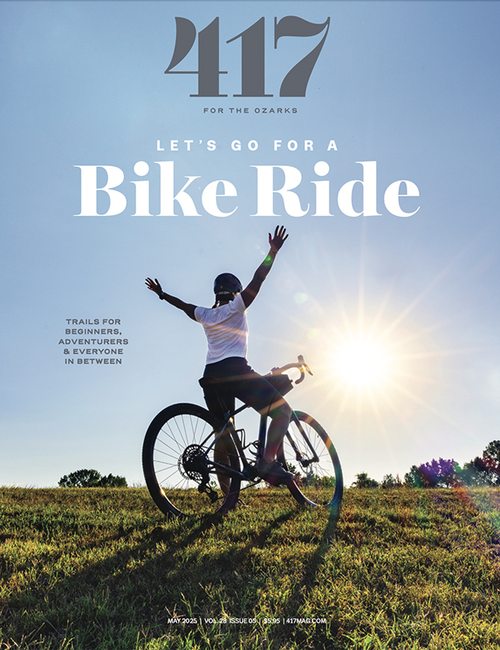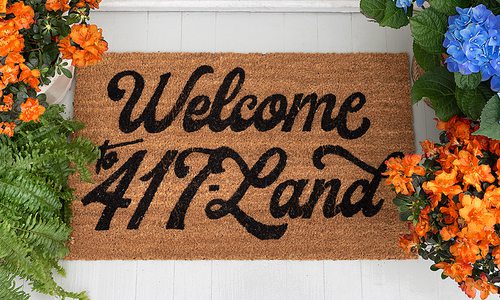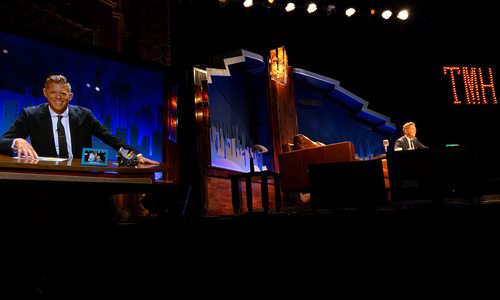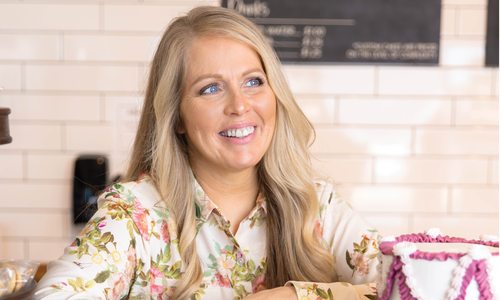Profiles
Behind the Scenes of The Mystery Hour
An inside look into how Jeff Houghton and his team make Springfield MO’s late-night talk show happen.
By Evan Greenberg
May 2019
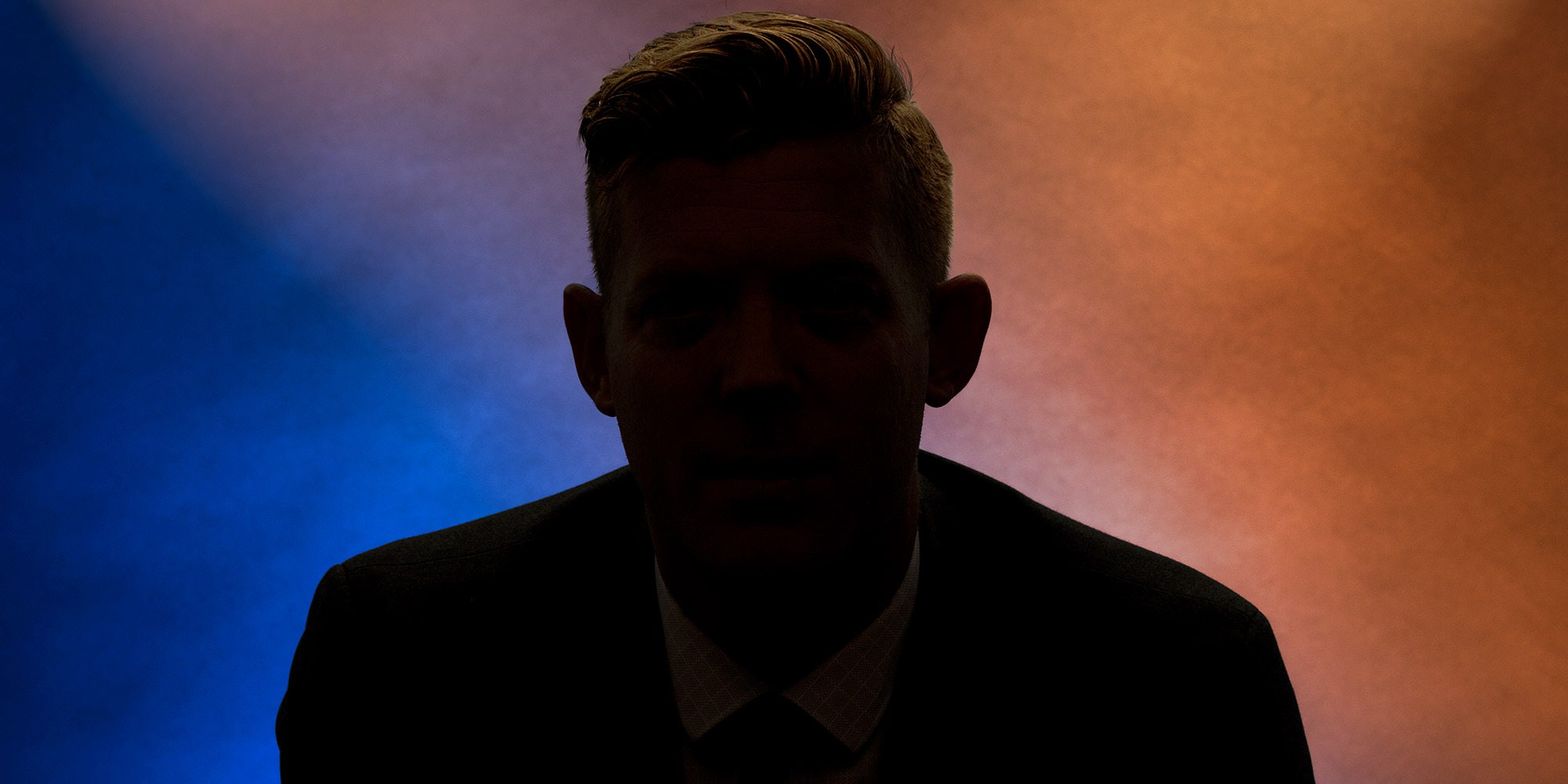
It’s Tuesday of a The Mystery Hour show week for Jeff Houghton and his writers, and there’s a problem. They are tucked into a side room in his Springfield home working on cracking the flow of a segment for the 2018–2019 season premiere of The Mystery Hour, the local late-night talk show Houghton hosts and the only one of its kind. Show day is three days away, and there’s still work to be done. There’s a rhythm they want to hit, and it’s just not working. Each writer is scheduled to deliver a rant on a different topic—Sarah Jenkins has one on the ripeness of bananas; Chad Harris has a rant on credit card chips that escalates more than the others as he imagines a scenario in which he ends up in prison. Given their subject matter and sensibility, some rants are a bit punchier than others, some tighter and more jokey.
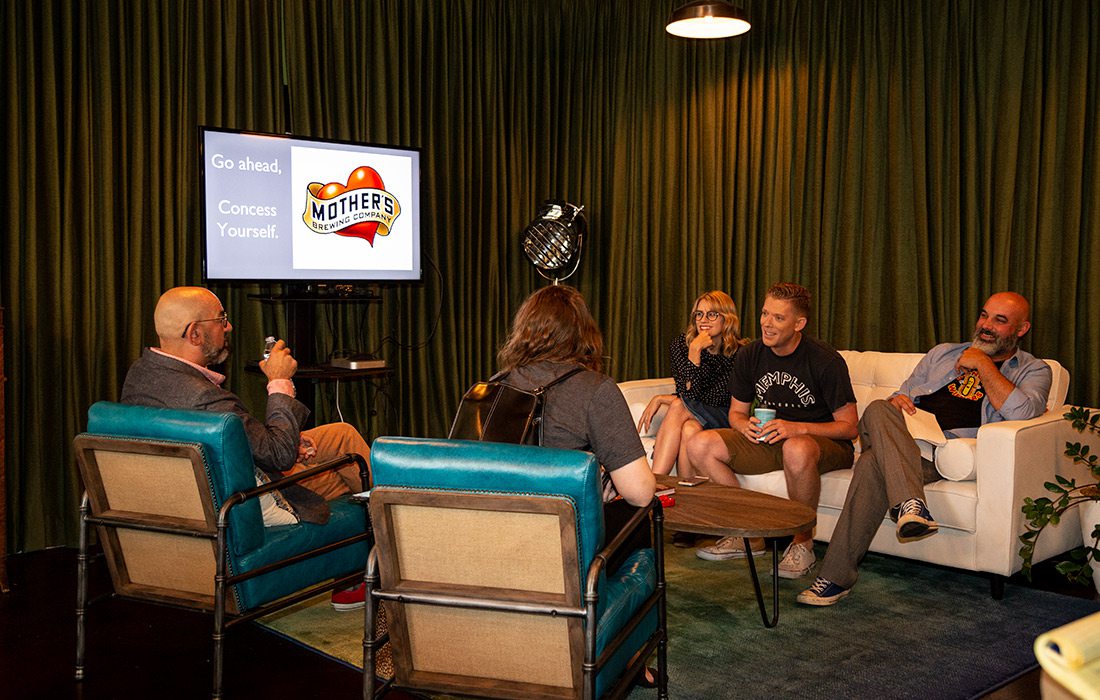
How should they all transition from one to the next? And more importantly, how should the segment be introduced in the first place, so it doesn’t come out of nowhere? This is a comedy show, but it has to have structure. Otherwise, the audience won’t come along for the ride. Houghton bolts into the hallway at one point, as if the Emmys and giant Campbell soup can lamp and books lined along the shelf might provide an answer. “I have it!” he exclaims as he returns only to realize he does not in fact have it. It takes another 30 minutes until the team reaches a solution they all agree on. There’s still more writing to do, but that’ll get done. After all, they have a show to put on.
HOW IT WORKS
If you’re not familiar with The Mystery Hour, here’s an abridged version of its history: It’s hosted by Jeff Houghton, a former intern at The Late Show with David Letterman. Houghton created The Mystery Hour at The Skinny Improv in downtown Springfield. The show graduated to an art studio at Randy Bacon Photography and followed Houghton as he moved away from and back to Springfield. The show eventually arrived at Gillioz Theatre in 2013, where it is broadcast to local television affiliates. The show has grown each year since. It now appears in 10 markets as far east as Charlotte, North Carolina, and books high-profile guests like comedian Paul Scheer and actor Leslie David Baker of The Office fame. That show was the program’s first sold-out filming at the Gillioz.
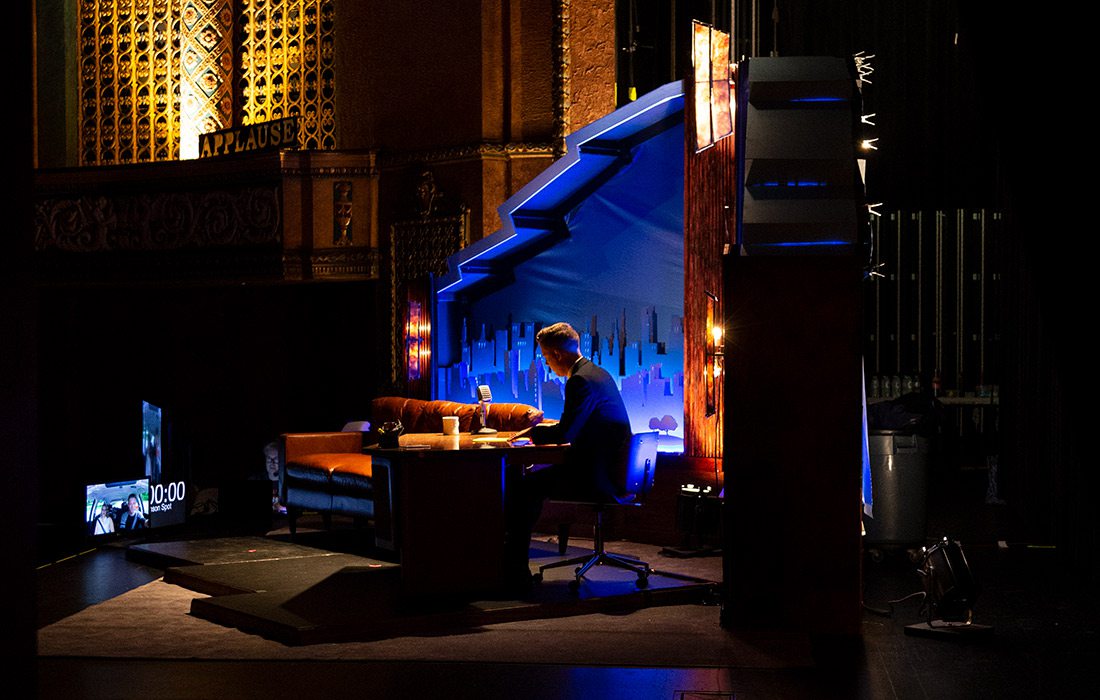
The Mystery Hour is modeled after the late-night shows you’re familiar with, with bits and pre-taped videos airing before a live studio audience. But Springfield is the only place with its own late-night talk show where the audience can watch Houghton tape three shows in a night that air throughout the subsequent month. Houghton is at the center of it all, a host uniquely suited for this job in particular, a host who takes great joy in bringing a format that really only exists on either coast to the heart of the Midwest. He is affable and easygoing, and whatever nervous energy he insists he has in the lead-up to the show doesn’t show up on camera.
“Jeff is amazing,” says writer and performer Nate Black, who has known Houghton for more than a decade and has been with the show since it arrived at the Gillioz. “He genuinely cares about everybody. He knows a good idea when he hears it. He doesn’t really change based on who he’s talking to. He’s a very interactive person. You give him one thing that’s personal about you, and he will remember it until the day he dies. He’s really good about finding things to engage you on.”
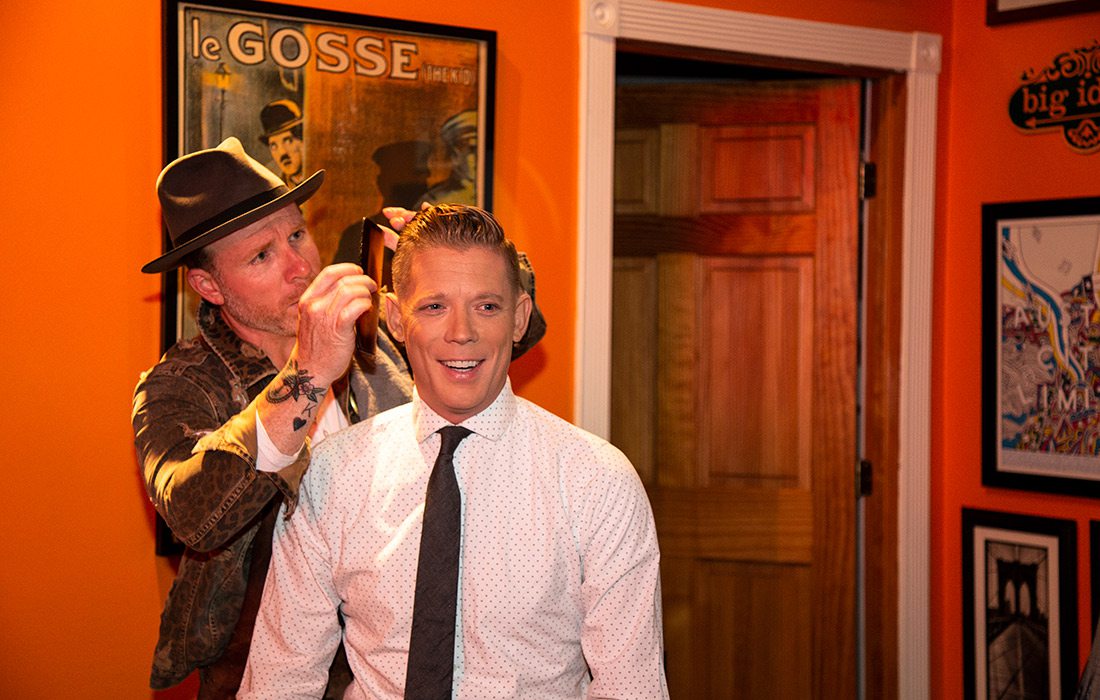
WRITING FOR TV
Houghton is the leader of a small army of writers, producers and performers, all of whom are doing this, as Jenkins puts it, “semi-professionally.” Jenkins is one of several writers who meet once a week to talk about shows past, present and future. The group helps write sketches and attempts to scale down what is, by all means, a massive endeavor for just nine people all sitting on couches illuminated by lamplight. The group is proud that its makeup is half-female, including Houghton’s wife, Michelle, who jumped on board after she recognized an opportunity to be a part of something that her husband devotes so much of his time to.
During these weekly brainstorming sessions, Houghton gives his writers space to pitch, but he offers suggestions when he sees fit. He has an instinctive ability to improve a joke or bit when needed. If ever you’re missing a piece to a puzzle, there’s a good chance he knows where it is and where to place it. “In the brainstorming parts of it, I think as a writer and fellow brainstormer so as not to restrict the brainstorming,” Houghton says. “When we get an idea, we try to think of, ‘How can we practically make this work?’ I do have to go back and forth. I like Writer Jeff more than Producer Jeff, but I have to play both roles.”
“He genuinely cares about everybody. He knows a good idea when he hears it.”— Nate Black, writer and performer for the Mystery Hour
There’s something innate that clicks into place when this group of creative people collaborates together. There’s a magic that is both fleeting and invigorating. It’s the type of thing you could make a lot of money on if you could figure out how to bottle and sell it. This ephemerality is what makes comedy a unique artform—the performance you see will only happen once; you are taking the best educated guess as to what your audience will respond to. Such is the conundrum The Mystery Hour writers face doing a show that appeals to a demographic that is growing by the year, while at the same time maintaining the show’s DNA. “There’s not really an instruction manual for late night TV,” Jenkins says. “What we’re doing is unprecedented—to be doing this kind of show in a smaller market with a smaller budget.”
That smaller budget is perhaps underselling things a bit—Jenkins tells stories of writers running to the store to buy props and go shopping for supplies. Black took off work for a recent taping to build props. It’s here that The Mystery Hour differs most from a large-scale network late night show. While writers help with planning, blocking and writing sketches, they must also be producers and help procure whatever it is they’ll need for a bit because if they don’t, it won’t get done.
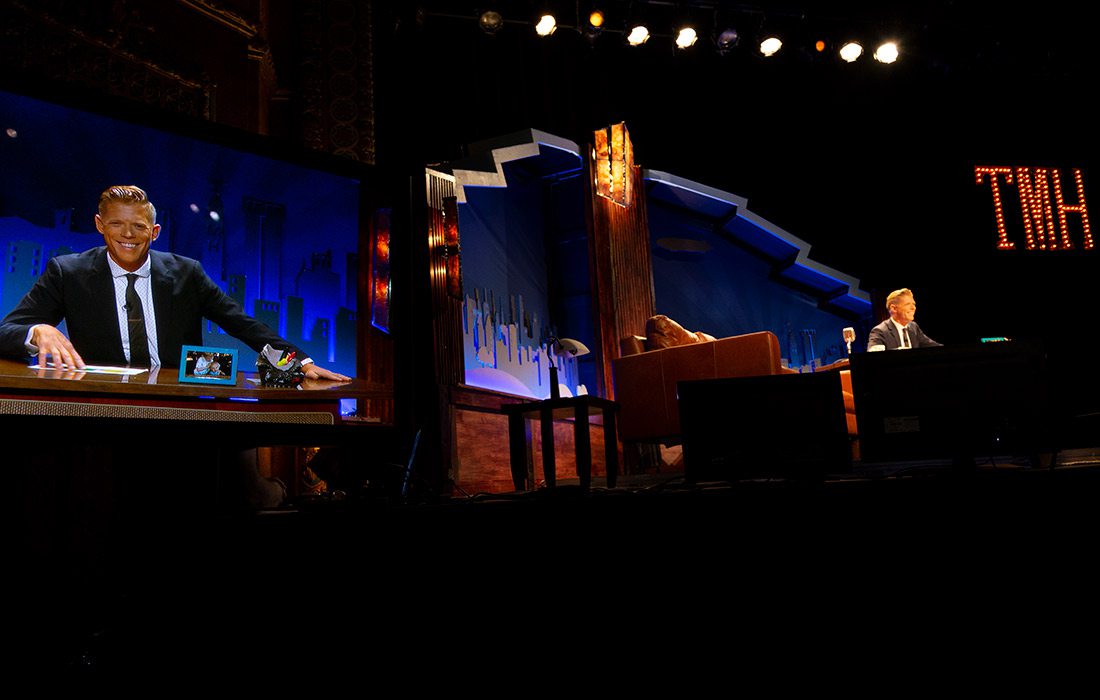
DOING IT LIVE
At the taping, the bit that Houghton and his writers agonized over—it doesn’t go well. Of course, it’s all fixed in editing, but if you were in the audience that night, you got to see the organic machinations behind a television show—something not many people ever get to see. “There’s plenty of live shows to be seen in Springfield,” Jenkins says. “You can see a Little Theatre show at the Landers [Theatre], but you don’t want to see the mistakes. You don’t go watch the rehearsal process. For us you get to see the finished product as well as the behind-the-scenes, hidden stuff.”
You also get to see Houghton in his element as he interacts with the audience between segments. This is something he picked up while attending a taping of Craig Ferguson’s now-defunct The Late Late Show. The show was known for its laissez-faire attitude toward the form itself and its willingness to acutely acknowledge the fourth wall. On set at The Mystery Hour, Houghton is energized and loose during a taping. He seems casual and relaxed. It’s kind of a wonder to see his switch flip when the cameras are on: His guest is the most important person in the room, and, as those around him will attest, that focused interest is all genuine.
“The coolest part for me is watching him interact when the guests are on the show and the segment is over, when he sits and just really connects with [the guests]—it is super-inspiring,” Black says. “You can tell that he truly cares about these people and their stories. Unless you go to the live show, you wouldn’t get to see how much joy [Houghton] has doing that part. To me it’s those moments that you can see this is why he does this. If there’s anything that’s super-special about the show, it’s those moments.”
GOING FORWARD
It’s always been Houghton’s goal to take The Mystery Hour national and to do so in Springfield. The Mystery Hour is built to last. It’s produced through mechanical processes honed through trial and error and years of practice, and the show is still growing—expanding to a place like Charlotte isn’t something that happens on accident. Neither is selling out a theatre that books national touring acts on a monthly basis. “I can’t tell you how many times, Jeff, me, or whoever else, when we’re backstage before a show starts, [thinks] ‘This is so stupid that we’re doing this right now,’” Black says. “This is just a bunch of people that just want to do exactly what we’re doing but don’t really have a way to do it. So we just do it in Springfield.”

